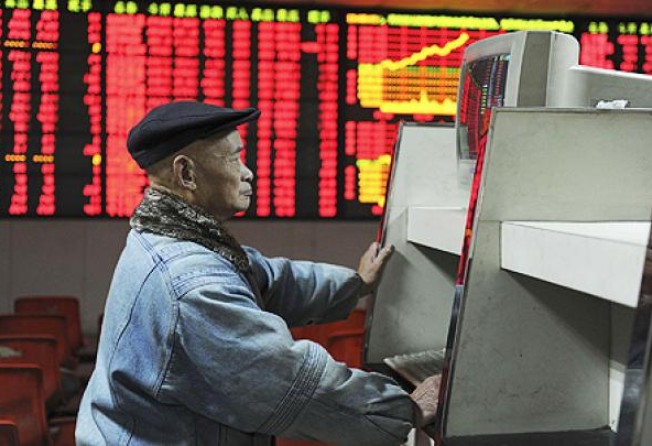China stock slump highlights market flaws

Chinese stocks this year fell to levels unseen since the global financial crisis, as investors ignored a rebound in the world’s second largest economy and focused on fundamental problems with the market.
China’s economic growth hit a more than three-year low of 7.4 per cent in the third quarter, although recent manufacturing and other data have fuelled optimism that it has begun to recover.
But for the country’s 168 million investors – an unusually high 99 per cent of them individuals – an improving macro-economic picture cannot make up for weak company earnings, poor governance, oversupply of shares and a lack of liquidity, analysts said.
On December 4, the benchmark Shanghai Composite Index plumbed a four-year low of 1,949.46 points, its worst level since January 16, 2009. It has since recovered more than 14 per cent and is up 1.54 per cent on the start of this year.
But in contrast Hong Kong’s Hang Seng Index has powered ahead almost 23 per cent for the year to date, Tokyo’s Nikkei 225 also rose nearly 23 per cent and the S&P 500 is up more than 11 per cent.
The disconnect is stark – China is still by far the fastest-growing major world economy – but there are fundamental reasons for the Shanghai market’s poor showing.
“Just know this – the performance of the domestic equity market is not so tightly correlated with the overall economy,” said Wang Tao, a Hong Kong-based economist for UBS.
“Structural and governance issues remain and continue to plague China’s equity market,” she said in a report which described the country’s stock market as one of the worst performing in the world.
Many listed Chinese companies are still majority state-owned, and so are largely indifferent to the demands of holders of their publicly-listed shares.
China also has a massive share glut, with the total value of flotations over the last two years estimated at US$1.3 trillion and hundreds more companies waiting to list as the government – not the market – decides which firms are allowed to do so.
At the same time, while Chinese investors have few alternatives to the stock market many have opted for wealth management products offered by banks, or property purchases.
“The fundamental issue of supply and demand imbalance needs to be solved, or even an economic recovery may not be able to reverse the downtrend,” said BOC International analyst Shen Jun.
Shanghai-based Woo, a small luxury scarf retailer, would like to seek funding from the market but expects it will take three years to make it through the listing pipeline, starving the firm of the capital it needs for expansion.
“So far, there are 800 companies queuing,” said its chief executive Stephen Sun.
Hopes that an annual government economic meeting would unveil steps to boost growth drove the Shanghai index rebound in December, including a rise of more than 4 per cent the day before the gathering began.
But the event yielded no new policies to reform capital markets, and some analysts remain pessimistic.
“Before, everyone had fallen into the ice cellar, now everyone has reached bright sunny skies. The change shouldn’t be so fast; the recovery should be gradual,” said Shenyin Wanguo Securities analyst Qian Qimin.
He forecasts the Shanghai market could once again fall through the key support level of 2,000 points.
Officials say the authorities are considering allowing local pension funds – now limited to putting their money into bank deposits and government bonds – to buy shares and have already allowed foreign institutional investors greater access to the stock market.
But foreign investors – who are often more positive about Chinese shares – still have to abide by a quota system.
“The market has been expecting new policies this year, but in fact there weren’t any good policies,” said BOC International’s Shen.
Vague government affirmations of support for financial reform were meaningless without concrete action, he said. “Some policies were just like ‘old wine in new bottles’ – nothing new there.”